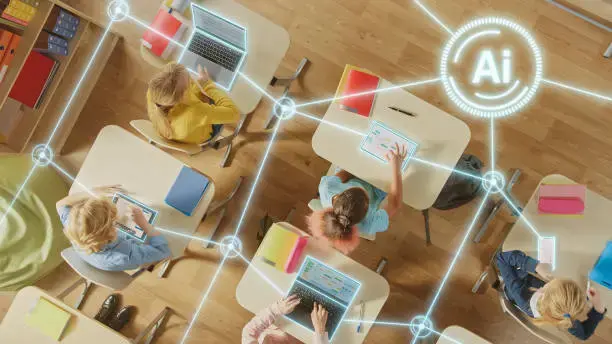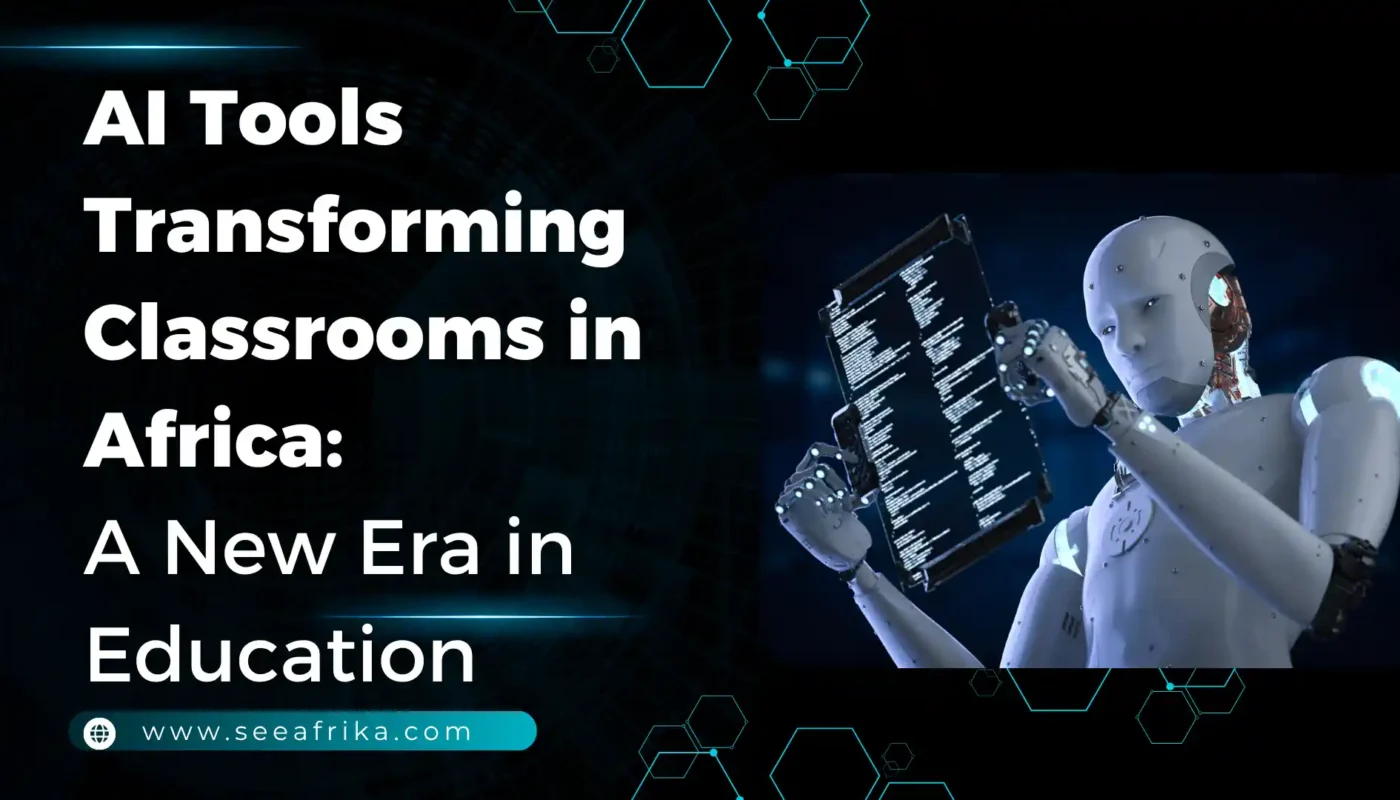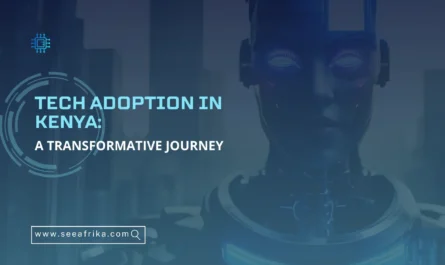Imagine a classroom where every student learns at their own pace, with lessons tailored to their unique needs. This vision is becoming a reality thanks to AI tools transforming classrooms across Africa. These technologies are revolutionizing education by making learning more accessible, personalized, and effective. As African countries embrace this wave of innovation, educators, students, and policymakers alike are witnessing a profound shift in how knowledge is delivered and absorbed.
Why is this transformation so crucial? Africa faces unique educational challenges, including teacher shortages and resource constraints, as well as vast rural populations with limited access to quality education. Therefore, AI-powered solutions offer a promising way to bridge these gaps.
This article explores how AI tools transforming classrooms are reshaping education on the continent, the benefits they bring, real-life success stories, challenges faced, and what the future holds.

The Role of AI in Education
Artificial intelligence is no longer just a futuristic concept; it is actively shaping classrooms worldwide. In Africa, AI is being leveraged to automate administrative tasks, personalize learning experiences, and provide educators with data-driven insights.
For example, AI can analyze student performance to identify learning gaps and suggest tailored interventions. It can also automate grading and lesson planning, freeing teachers to focus on direct student engagement. Moreover, AI-powered chatbots and virtual tutors offer round-the-clock support, enabling students to learn outside the traditional classroom environment.
Also read: African Schools Embrace the AI Revolution
Therefore, AI is not just a tool but a catalyst for systemic change in education.
As Mr Moustapha Mamba Guirassy, former Minister of Communication, Telecommunications, and ICT in Senegal, puts it:
“Digital education and artificial intelligence are key levers for transforming our education systems. Let’s unite our efforts to tackle this decisive turning point together”.
Benefits of AI Tools in African Classrooms
The impact of AI tools transforming classrooms in Africa is multifaceted and profound. Here are some key benefits:
- Personalized Learning: AI tailors content to meet the individual needs of each student, enabling learners to progress at their own pace. This is especially important in diverse classrooms where students have varying levels of ability.
- Improved Access: AI-powered platforms, such as Kenya’s M-Shule, utilize SMS technology to reach students without internet or smartphones, thereby expanding educational access to remote and underserved areas.
- Teacher Support: AI automates time-consuming tasks such as grading and attendance, allowing teachers to dedicate more time to instruction and student interaction.
- Enhanced Learning Outcomes: By providing real-time feedback and targeted content, AI helps improve comprehension and retention.
- Cross-Cultural Relevance: AI tools can incorporate culturally relevant examples and local languages, making learning more relatable and compelling.
Case Studies of Successful AI Implementation
Across Africa, AI tools transforming classrooms are no longer just theoretical concepts—they are actively reshaping education through innovative, real-world applications. These case studies demonstrate how AI can enhance learning outcomes, increase accessibility, and personalize education, even in resource-constrained environments.
Let’s explore some standout examples that highlight the power and potential of AI in African classrooms.
1. African Leadership University (ALU): Personalized, Mission-Driven Learning
The African Leadership University (ALU) has taken a bold approach to education by integrating AI into a mission-oriented learning model designed to cultivate future leaders. Unlike traditional universities that rely on fixed curricula and rote memorization, ALU utilizes AI tools to transform classrooms, creating personalized curricula aligned with each student’s passions, career goals, and real-world challenges.
By leveraging AI and cloud-based platforms, ALU enables students to track their learning progress, collaborate across courses, and engage in problem-solving projects that matter to Africa’s development. The university’s learning management system, powered by AI and hosted on scalable cloud infrastructure, analyzes student data to recommend resources and learning pathways tailored to individual needs.
Veda Sunassee, CEO of African Leadership University Rwanda, emphasizes that ALU’s model focuses on experiential learning and creativity rather than memorization. AI supports this by providing just-in-time learning resources and enabling students to ask more profound questions rather than simply regurgitate facts. This approach has helped ALU nurture ethical, entrepreneurial leaders who are prepared to tackle Africa’s complex challenges with innovative solutions.
The success of ALU’s AI-enabled platform demonstrates how AI tools transforming classrooms can create more engaging, relevant, and effective higher education experiences that prepare students for a rapidly changing world.
2. uLesson (Nigeria): AI Analytics for Accessible Quality Education
In Nigeria, uLesson is a shining example of how AI tools transforming classrooms can make quality education accessible through mobile technology. uLesson utilizes AI analytics to track learners’ progress and deliver personalized content via smartphones, which are becoming increasingly widespread across Africa.
The platform assesses student performance in real time and adapts lessons accordingly, ensuring that learners receive personalized support exactly where they need it. For example, if a student struggles with a math concept, uLesson’s AI algorithms adjust the difficulty level, provide additional explanations, or offer interactive quizzes to reinforce understanding.
By harnessing mobile devices, uLesson overcomes traditional barriers, including limited physical infrastructure and teacher shortages. It brings high-quality, curriculum-aligned content directly to students’ fingertips, enabling learning anytime and anywhere.
This model has proven especially effective during school closures caused by the COVID-19 pandemic, when remote learning became a necessity. uLesson’s AI-driven approach has helped thousands of Nigerian students maintain academic progress despite disruptions, illustrating the transformative potential of AI-powered edtech in African classrooms.
Also read: Nigeria’s Tech Revolution: Leading the Way in African Startups
3. M-Shule (Kenya): SMS-Based AI for Remote Learners
One of the most innovative examples of AI tools transforming classrooms in Africa is Kenya’s M-Shule platform, which utilizes SMS-based AI to reach students who lack access to smartphones or the internet. This approach is particularly impactful in rural and low-income areas where digital divides are most pronounced.
M-Shule’s AI system analyzes student responses to quizzes sent via simple text messages and then tailors subsequent lessons to address knowledge gaps. This hyper-localized, low-tech solution delivers personalized education without requiring expensive devices or broadband connections.
By leveraging the ubiquity of basic mobile phones, M-Shule expands educational access to marginalized communities that often fall outside the reach of traditional digital learning platforms. The platform also incorporates local languages and culturally relevant content, increasing engagement and comprehension.
Also read: Tech Adoption in Kenya: A Transformative Journey
M-Shule’s success proves that AI tools transforming classrooms do not always require cutting-edge technology; instead, they require creativity and commitment to meet learners where they are.
4. Western Cape AI Innovation Labs (South Africa): Localized AI Tutoring Bots
In South Africa, the Western Cape AI Innovation Labs exemplify how teacher-led initiatives can harness AI to meet community-specific educational needs. These labs have developed AI-powered tutoring bots that communicate in local languages such as isiXhosa and Zulu, making learning more accessible and culturally relevant.
These AI tutors offer personalized support in subjects such as mathematics and literacy, tailoring their approach to each student’s learning pace and style. By integrating local languages, the bots help overcome language barriers that often hinder comprehension and participation in classrooms where English or Afrikaans is the dominant language.
Moreover, these labs emphasize teacher involvement in AI development, ensuring that the tools complement rather than replace educators. Teachers utilize AI analytics to identify students who are struggling and customize interventions, thereby fostering a collaborative learning environment.
This initiative highlights the importance of localization and teacher empowerment in the success of AI tools transforming classrooms. It shows that AI can be a culturally sensitive and community-driven force for educational improvement.
What These Case Studies Teach Us
These examples collectively demonstrate that AI tools transforming classrooms in Africa can work effectively even in low-resource settings. The key factors for success include:
- Contextual Innovation: Tailoring AI solutions to local languages, cultures, and technological realities.
- Accessibility: Designing platforms that work on basic mobile phones or low-bandwidth connections.
- Teacher Empowerment: Involving educators in AI integration to enhance, not replace, their roles.
- Personalization: Using AI analytics to adapt learning to individual student needs and progress.
- Scalability: Leveraging cloud infrastructure and mobile technology to reach large, dispersed populations.
Together, these case studies provide a roadmap for how AI can bridge longstanding educational gaps in Africa. They prove that with commitment, creativity, and collaboration, AI-powered education can become a powerful equalizer, unlocking opportunities for millions of learners across the continent.
As Africa continues to invest in AI-driven education, these pioneering projects serve as inspiring models for governments, edtech companies, and educators eager to harness the full potential of AI tools transforming classrooms.
Challenges Facing AI Adoption
Despite its promise, the adoption of AI in African education is not without hurdles:
- Infrastructure Deficits: Many schools lack reliable electricity and internet connectivity, limiting access to AI-powered digital classrooms.
- Teacher Training Gaps: Only a minority of African teachers have received ICT training, and fewer still are equipped to integrate AI into their teaching.
- Data Privacy Concerns: Handling sensitive student data raises ethical questions that require clear policies and safeguards.
- Digital Inequality: There is a risk that AI tools may deepen educational disparities if they remain accessible only to urban or wealthier populations.
- Policy and Political Will: Many governments have yet to embed AI education into national strategies or allocate sufficient funding.
Addressing these challenges requires coordinated efforts among governments, educators, technology providers, and communities.
Future Prospects for AI in African Education
Looking ahead, the future of AI tools transforming classrooms in Africa is undeniably bright, yet it hinges on deliberate and strategic action across several critical areas. To fully harness AI’s transformative potential, stakeholders must invest in infrastructure, empower educators through upskilling, develop inclusive policies, foster partnerships, and encourage local innovation.
Each of these pillars plays a vital role in ensuring that AI-driven education becomes accessible, effective, and sustainable across the continent.
1. Investment in Infrastructure
A foundational step for the widespread adoption of AI tools transforming classrooms is robust infrastructure. Many African schools, particularly in rural and underserved areas, face persistent challenges, including unreliable electricity and limited internet connectivity. Without these basic utilities, even the most advanced AI-powered educational platforms cannot function effectively.
Expanding internet access is crucial. According to recent studies, over 70% of children in sub-Saharan Africa lack access to digital learning tools due to connectivity issues. Therefore, governments and private sector players must prioritize investments in broadband networks, satellite internet, and solar-powered electricity solutions tailored for schools. These investments will enable AI platforms to operate smoothly, allowing students to access personalized learning content at any time and from anywhere.
Also read: Top 10 African Countries Leading in Private Sector Investments
Moreover, infrastructure development must be inclusive. It should reach both remote villages and urban centers to avoid deepening the digital divide. For example, SMS-based AI learning tools like Kenya’s M-Shule have shown how low-data solutions can bridge gaps where the internet is scarce. However, scaling such solutions requires reliable mobile networks and energy sources.
Without foundational infrastructure, the promise of AI tools transforming classrooms will remain out of reach for millions of African learners.
2. Teacher Upskilling
Even with the best AI technologies, the success of AI tools transforming classrooms depends heavily on educators who can effectively integrate these tools into their teaching. Currently, a significant skills gap exists: fewer than a quarter of teachers in many African countries have received adequate ICT training, let alone training specific to AI.
Therefore, comprehensive teacher upskilling programs are essential. Training must go beyond basic digital literacy to include how AI can personalize learning, automate administrative tasks, and provide real-time student analytics. When teachers understand and trust AI tools, they can harness them to enhance instruction, identify struggling learners early, and foster critical thinking.
Importantly, upskilling empowers teachers to transition from traditional roles into facilitators, mentors, and content curators. As noted by education experts, AI will not replace teachers but redefine their roles, allowing them to focus more on creativity and emotional support rather than routine tasks.
Also read: 10 Best Universities in Africa
Governments, NGOs, and edtech companies must collaborate to develop accessible, context-specific training modules. For instance, blended learning programs combining online courses with in-person workshops can reach teachers in remote areas. Furthermore, incentivizing continuous professional development will help sustain AI integration in classrooms.
Ultimately, teacher empowerment through AI training is a strategic necessity to unlock the full potential of AI tools transforming classrooms.
3. Inclusive Policies
The future of AI tools transforming classrooms in Africa also depends on forward-thinking policies that promote equitable access and safeguard data privacy. Governments must develop regulatory frameworks that ensure AI technologies are deployed ethically and inclusively.
Inclusive policies should address:
- Equitable Access: Ensuring AI-powered education reaches marginalized groups, including girls, learners with disabilities, and rural communities. This means subsidizing devices, expanding connectivity, and supporting low-bandwidth AI solutions.
- Data Protection: Establishing clear guidelines on how student data is collected, stored, and used to protect privacy and prevent misuse. Transparency and consent must be pillars of any AI deployment.
- Curriculum Integration: Updating national education curricula to incorporate AI literacy, preparing students for a digital economy.
- Funding and Incentives: Allocating public funds and creating incentives for private sector innovation in AI education.
Such policies will create an enabling environment where AI tools transforming classrooms can thrive responsibly. Without them, there is a risk of widening inequalities or ethical breaches that undermine trust in AI.
4. Partnerships
No single entity can drive the AI revolution in African education alone. Successful scaling of AI tools transforming classrooms requires strong partnerships among governments, private sector innovators, NGOs, and international organizations.
Public-private partnerships can mobilize resources, share expertise, and pilot innovative AI solutions in diverse settings. For example, collaborations between ministries of education and tech startups have led to the deployment of AI-driven literacy apps in Kenya and Nigeria, reaching millions of learners.
NGOs and donor agencies play a vital role in funding projects, conducting research, and advocating for inclusive policies. Meanwhile, local universities and research institutions contribute by developing AI applications tailored to African contexts.
Moreover, partnerships foster knowledge exchange and capacity building. Regional EdTech networks and AI innovation hubs enable stakeholders to share best practices, avoid duplication, and co-create solutions that address common challenges.
Therefore, multi-sector collaboration is a powerful accelerator for embedding AI tools transforming classrooms into Africa’s education systems at scale.
5. Local Innovation
Finally, the sustainability and relevance of AI tools transforming classrooms depend on fostering local innovation. Africa’s rich linguistic, cultural, and educational diversity demands AI solutions that are designed by Africans for Africans.
Encouraging homegrown AI startups and research initiatives ensures that platforms incorporate local languages, cultural examples, and pedagogical approaches that resonate with learners. For instance, AI tutoring bots developed in isiXhosa or Swahili can engage students more effectively than generic tools.
Local innovation also reduces reliance on imported technologies, which may not fully understand or address African educational realities. This builds digital sovereignty and stimulates economic growth by creating new jobs in AI development, content creation, and data analytics.
Governments and investors should therefore prioritize funding and incubating African AI edtech ventures. Universities can integrate AI research into their curricula, nurturing the next generation of innovators.
By championing local solutions, Africa can lead the global conversation on AI in education, ensuring that AI tools transforming classrooms reflect and uplift its unique contexts.
Conclusion
AI tools transforming classrooms in Africa are ushering in a new era of education—one that is more personalized, accessible, and effective. From automating administrative tasks to delivering tailored learning experiences, these technologies are addressing long-standing challenges and opening new opportunities for millions of students and educators.
However, realizing AI’s full potential requires overcoming significant obstacles, including infrastructure gaps, teacher training needs, and policy shortcomings. With sustained investment, inclusive strategies, and local innovation, Africa can leapfrog traditional education barriers and create a future-ready generation.
Are you ready to explore how AI can transform education in your community? Share your thoughts and experiences with AI tools in classrooms in the comments below. Together, we can shape the future of learning in Africa.
If you enjoy our content, you’ll love the amazing stories we share on Facebook, Telegram, and Twitter!
Subscribe and follow us for more premium SeeAfrika content.





This was really a good read!
It’s important to see and know how technological advancement is changing and help the education sector in Africa.
Thank you
Thank you so much for your thoughtful comment!
I completely agree—technological advancements, especially artificial intelligence (AI), have immense potential to transform education across Africa by making learning more accessible and personalized.
It’s exciting to see how innovation is opening new doors for students and educators alike.